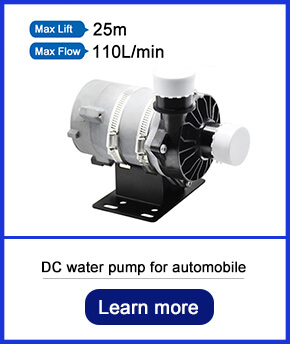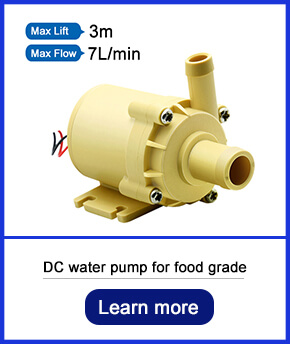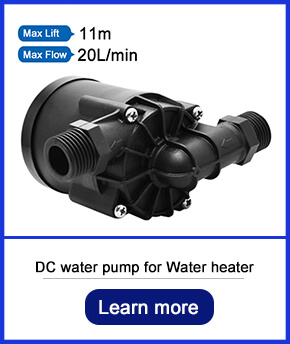A DC water pump, a vital device in fluid handling, is powered by a DC power supply and serves the crucial functions of transporting and pressurizing liquids. It operates on the principle of converting electrical energy into mechanical energy via the rotational torque of a DC motor, which in turn drives the impeller to rotate and propel the fluid through the pipeline. During operation, the coil and commutator rotate while the magnet and carbon brush remain stationary, with the commutator and electric brush (which rotate with the motor) responsible for changing the coil's communication direction. The key components of a DC water pump encompass a motor, pump body, impeller, sealing device, and a sophisticated control system.
 |  |  |
DC Pump Classification:
1. Brushed DC water pump: In the operation of a brushed DC water pump, the coil and commutator rotate in tandem, while the magnet and carbon brush remain stationary. The reversal of the coil current's direction is accomplished through the coordinated rotation of the commutator and brush by the motor. Despite its relatively lower price point, brushed DC water pumps suffer from the drawback of carbon brush wear, which inevitably leads to a shorter operational lifespan. The wear and tear of carbon brushes over time can result in increased noise levels and a reduced ability to effectively change the coil's current direction, ultimately affecting the pump's performance and longevity.
2. Brushless Motor Type DC water pump: Comprising a brushless DC motor and an impeller, this type of water pump features a connection between the motor shaft and the impeller. However, a notable gap exists between the stator and rotor. While brushless motor DC water pumps offer the advantages of high efficiency and cost-effectiveness, they are not without their challenges. Over an extended period of use, water has the propensity to infiltrate the motor, posing a significant risk of motor burnout. This vulnerability necessitates careful consideration when deploying such pumps in applications where water exposure is a concern.
3. Brushless DC Magnetic Drive Isolated Water Pump: This advanced type of water pump employs electronic components for commutation, eliminating the need for carbon brushes altogether. The shaft is constructed with high-performance, wear-resistant ceramic materials, both in the form of a ceramic shaft and a ceramic shaft sleeve, effectively mitigating wear and tear. The stator and rotor components are completely isolated, endowing the pump with a 100% waterproof capability. In addition to its waterproof feature, this pump exhibits low noise levels, a long service life, a compact size, and stable performance. These characteristics make it particularly well-suited for high-temperature environments, where it can operate with minimal maintenance requirements and offer reliable fluid handling capabilities.
Working principle:
1. Working Principle of Brushed DC water pump:
1) Disadvantages:The operation of a brushed DC water pump is marred by the inevitable wear and tear of carbon brushes. From the very start of motor rotation, the carbon brushes are subject to degradation. As the pump continues to run, the wear gap of the carbon brushes progressively widens, leading to an increase in operational noise. Prolonged continuous operation, typically after several hundred hours, can render the carbon brushes incapable of effectively changing the coil's current direction, thereby severely compromising the pump's functionality and potentially leading to complete failure.
2) Advantages: The primary advantage of brushed DC water pumps lies in their relatively low cost, making them an economical choice for applications where budget constraints are a significant consideration and the drawbacks associated with carbon brush wear can be tolerated within the operational lifespan requirements.
2. Working Principle of Brushless Motor DC water pump:
1) Configuration: The motor-type brushless DC pump consists of a brushless DC motor and an impeller, with the motor shaft directly connected to the impeller, facilitating the transfer of rotational energy to drive fluid movement.
2) Disadvantages: A notable drawback of this pump type is the presence of a gap between the stator and rotor. Over time, this gap allows water to seep into the motor, creating a conducive environment for electrical short circuits and ultimately resulting in motor burnout. This vulnerability demands careful attention to operating conditions and potential water ingress prevention measures.
3) Advantages: Brushless DC motors in this context benefit from standardization and mass production by specialized manufacturers. This leads to relatively lower costs compared to some alternative motor technologies. Additionally, they offer high operational efficiency, translating to reduced energy consumption and enhanced overall performance, making them an attractive option for applications where energy efficiency and cost-effectiveness are both important considerations.
Characteristics of DC water pump
1. Low Voltage Drive Capability: DC water pumps are engineered with a focus on low voltage operation, commonly designed to function optimally at voltages such as 12V and 24V. This characteristic renders them highly suitable for integration into battery-powered systems, where energy conservation and portability are crucial, as well as solar-powered setups, leveraging renewable energy sources for fluid handling applications.
2. High Energy Efficiency: The utilization of DC motors endows DC water pumps with an impressive energy efficiency ratio during operation. This means that they are capable of effectively converting electrical energy into mechanical work with minimal wastage, thereby significantly reducing overall energy consumption. This energy-efficient performance not only results in cost savings but also aligns with the growing global emphasis on sustainable energy use.
3. Compact and Lightweight Design: DC water pumps feature a compact and space-efficient design, characterized by a small volume and light weight. This physical configuration simplifies installation processes, allowing for easy integration into various systems and setups. Moreover, their lightweight nature facilitates handling and maintenance, reducing the need for complex support structures and making them a convenient choice for a wide range of applications.
4. Precision Flow Control: One of the notable advantages of DC water pumps is their ability to achieve precise flow control. By adjusting the voltage or current supplied to the pump, users can fine-tune the rotational speed of the impeller, thereby precisely regulating the flow rate of the fluid being pumped. This flexibility enables the pumps to meet the diverse and often specific requirements of different application scenarios, from delicate laboratory settings to large-scale industrial processes.
5. Versatile Application Range: DC water pumps have found extensive application across a multitude of fields. In the realm of household appliances, they are employed for boost circulation in water heaters and other systems, ensuring efficient heat distribution. In industrial settings, they play a crucial role in cooling water circulation for machinery and equipment, preventing overheating and maintaining optimal operating conditions. Additionally, in the automotive sector, they are utilized for battery electronic control circulation, contributing to the proper functioning of various vehicle systems. Their versatility and adaptability have made them an indispensable component in modern technology and infrastructure.
Precautions for selecting and using a DC water pump:When it comes to the selection and utilization of a DC water pump, several crucial considerations should be borne in mind:
1. Power Matching: It is of utmost importance to meticulously select the power rating of the DC water pump in accordance with the specific demands of the application. This ensures that the pump is adequately powered to meet the operational requirements without overloading or underperforming. By precisely matching the power, energy waste due to excessive power consumption can be effectively averted, optimizing the overall efficiency of the system.
2. Flow Rate and Pressure Requirements: The appropriate flow rate and pressure parameters for the DC water pump must be carefully determined based on the distance over which the liquid needs to be transported and the specific pressure demands of the application. Accurate assessment of these factors is essential to guarantee the efficient and effective operation of the pump, preventing issues such as insufficient flow or excessive pressure buildup.
3. Noise and Vibration Management: Opting for a DC water pump with low noise and vibration characteristics is highly recommended. This not only minimizes the potential disturbance to the surrounding environment but also contributes to a more comfortable and quiet operating atmosphere. Low noise and vibration levels are particularly crucial in applications where noise sensitivity is a concern, such as residential or certain industrial settings.
4. Maintenance and Longevity Considerations: Selecting a DC water pump that is designed for easy maintenance and exhibits a long service life is a prudent choice. A pump with straightforward maintenance procedures and durable components can significantly reduce the frequency of maintenance interventions and replacement requirements. This not only translates to cost savings in terms of maintenance expenses but also ensures the continuous and reliable operation of the pump over an extended period.
In conclusion, DC water pumps have firmly established themselves as indispensable components in a wide array of fields, owing to their distinctive set of advantages. As technology continues to progress and the boundaries of applications expand, we can anticipate a continuous evolution in the performance of DC water pumps. This evolution will not only enhance their existing capabilities but also pave the way for their integration into even more diverse and specialized applications, further solidifying their crucial role in modern fluid handling and energy management systems.
Address:No.30, Dapu lndustrial Street, Changping, Dongguan, Guangdong, China
Tel: +86-186 7628 8117